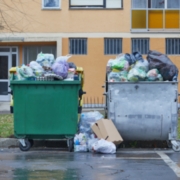Supporting Business: Commercial waste and the night time economy
APSE has always encouraged local authorities to develop innovative solutions to meeting the many challenges they face in an era of ever reducing funding. Changes to the way services are provided to make better use of resources and to control demand are often at the core of innovation. APSE Solutions has been banging the drum for underground, communal refuse storage, for instance for a number of years. The advantages are mainly around reducing the cost of collection but underground bins also reduce the need for street cleansing, boost the quality and quantity of recyclables and reduce vehicular movements.
For commercial waste operations underground storage facilities could be a cost effective answer to the problem of how to meet the needs of small businesses, where they can be trading round the clock, with little space to store waste. Rubbish sacks piled up on the street awaiting collection are not an unusual sight in town and city centres and create a significant additional burden on hard pressed cleansing operations. Frequent day and night time collections can ease the problem but give rise to safety issues, particularly at night, when refuse collection vehicles pose a risk to users of night time economy services. In many authorities night time collections are also expensive and erode the commercial viability of commercial waste operations. In locations where there are multiple operators, additional safety issues arise from collections being uncoordinated.
Underground bins vary in size and in the way that they are collected. The aim in a commercial area would be to provide sufficient capacity to significantly reduce the frequency of collections and obviate the need for this to take place at night. Controlled access through a fob allows detailed information to be collected on the level and type of waste disposed of by each business which, in turn, creates the possibility of accurate charging arrangements and incentives to boost recycling. Fill level sensors in bins further adds to the efficiency of the system.
APSE Solutions has looked in some detail at the financial case for underground refuse bins. The capital costs are high but very significant revenue savings make it an eminently affordable solution – at least in relation to domestic refuse where there is relative certainty about future demand. It is more difficult to make a case for a trade waste service because it is more difficult to project future revenues from a service that operates in a commercial environment. Thus, an innovation that has the potential to reduce cost to local businesses, improve the amenity value of town and city centres and eradicate risks associated with the night time removal of waste, is unlikely to be implemented – unless that is, a solution can be found to the inability to predict future volumes of business. APSE Solutions wonders whether the solution might be to incorporate the collection of commercial waste into a Business Improvement District scheme.
Business Improvement Districts (BIDs) are a mechanism by which improvements to an area can be funded from a precept on business rates. The establishment of a BID requires the agreement of a majority of businesses within a defined area. Once a BID has been agreed the associated precept applies to all business, regardless of how they voted in the ballot. Typically BID precepts pay for improvements to infrastructure and enhanced environmental services. In at least one case, a BID scheme has entered into a contract with a preferred collector of commercial waste.
A BID could be a mechanism to create a guaranteed revenue stream for a council commercial waste service that provide the long term financial certainty needed to invest in waste storage infrastructure. In essence, the cost of refuse collection would be met through a precept on the rates rather than through individual contracts.
The benefits to businesses would be ‘free’ or at least lower cost commercial waste collection, along with cleaner, safer streets that, in turn, could boost the attractiveness of the area to potential customers. The public would no longer need to negotiate their way past piles of rubbish waiting to be collected and there would be a much reduced need for street cleansing to deal with the inevitable spillage of rubbish onto the streets. Extending the scheme to include, for example, public toilet provision could add additional value and further reduce the clean-up costs associated with the increasingly heavy night time usage of our towns and cities.
If you are interested in this idea or would like to explore how APSE Solutions could help you to meet the many challenges of the current local government operating environment, we would love to hear from you. Please contact Andy Mudd, Head of APSE Solutions, by email or call 0161 772 1810.
Learn more about how APSE Solutions can support you and your services here.


.png)



.png)